On Saturday, August 17, 2024, the 3rd Hokkaido University Medical AI Symposium was held at the Hokkaido University Conference Hall. The symposium was organized by the Healthcare AIX Innovation Center of Hokkaido University Collaborative Project Center, the Clinical AI Human Resource Development Program (CLAP) of the Hokkaido University Graduate School of Medicine and the Medical AI Research and Development Center at Hokkaido University Hospital, with sponsorship from AIRS Medical, Canon Medical Systems Corporation, FUJIFILM Medical Co., Ltd., and the Medical Image Lab (NPO Organization). The event gathered numerous participants from academia, medical institutions, and private companies, both domestically and internationally. It was held in a hybrid format with 55 participants attending in person and 143 participants joining via Zoom, including 29 from overseas. Lively discussions took place regarding the latest advancements in medical AI technology and its future prospects.
The symposium featured seven sessions, including a luncheon seminar hosted by AIRS Medical, a company developing AI-powered MRI imaging technology in South Korea, and Star Product Corporation, a company that imports medical devices into Japan. Other sessions included Medical AI Research in Imaging, Surgery, Gait, Informatics and two evening seminars, “Evening Seminar 1” and “Evening Seminar 2,” sponsored by Canon Medical Systems Corporation and FUJIFILM Medical Co., Ltd respectively. From Hokkaido University, five researchers gave presentations, with additional presentations from four researchers from domestic universities and companies, and four researchers from overseas universities. Furthermore, three researchers from international universities and hospitals participated as chairs and discussants. Given the significant international participation, the entire symposium was conducted in English.
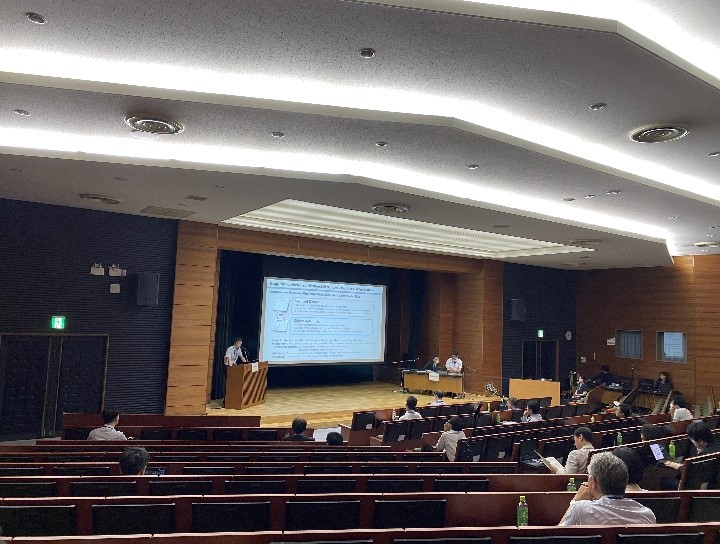 On-site Event Overview
On-site Event Overview
Luncheon Seminar (Hosted by AIRS Medical and Star Product Corporation)
During the luncheon seminar, Professor Kohsuke Kudo, Chair of the Department of Diagnostic Imaging at Hokkaido University Graduate School of Medicine, served as the session chair. We had the honor of hearing presentations from Professor Jongho Lee of the Department of Electrical and Computer Engineering at Seoul National University, South Korea, and Dr. Noriyuki Fujima, Senior Lecturer at the Department of Diagnostic and Interventional Radiology, Hokkaido University Hospital.
Professor Jongho Lee delivered a presentation titled “My Fast MRI Challenge,” where he introduced the history and advancements in reducing MRI scan times, showcasing AIRS Medical’s cutting-edge AI-powered product, SwiftMR, which significantly shortens MRI scan times. This product is gaining attention for its ability to reconstruct high-quality images from reduced data collected in shorter scan times and its vendor-neutral compatibility with various MR manufacturers.
Dr. Fujima gave a presentation titled “Revolutionary Image Quality Improvement and its Clinical Impact Achieved by SwiftMR,” explaining the structure of SwiftMR’s AI model. Using real clinical images, he demonstrated how SwiftMR achieves shorter scan times and enhances image quality. The seminar highlighted that SwiftMR technology can deliver image quality comparable to high-field MRI even at low-field settings, sparking discussions on the practical applications of AI in clinical settings.
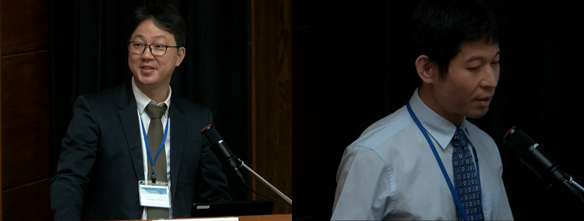 Presentations by Professor Jongho Lee (left) and Senior Lecturer Noriyuki Fujima (right)
Presentations by Professor Jongho Lee (left) and Senior Lecturer Noriyuki Fujima (right)
Medical AI Research in Imaging
This session was chaired by Professor Wan-Yuo Guo from the Department of Radiology at Taipei Veterans General Hospital, Taiwan, and Professor Seung Hong Choi from the Department of Radiology at Seoul National University Hospital, South Korea. Dr. Melissa Chen, Associate Professor at MD Anderson Cancer Center, USA, served as the discussant. The session featured presentations by Professor Yoshiyuki Watanabe from the Department of Radiology at Shiga University of Medical Science and Distinguished Professor Cheng-Yu Chen from the Department of Radiology at Taipei Medical University College of Medicine, Taiwan.
Professor Watanabe presented on “Opportunistic Screening using CT,” introducing the concept of opportunistic screening with CT scans. He highlighted the application of AI in automatically detecting vertebral compression fractures and performing intercostal muscle segmentation. Notably, he demonstrated a correlation between intercostal muscle volume and respiratory function and emphasized that AI-driven detection of vertebral compression fractures holds the potential to enhance screening accuracy and improve healthcare outcomes.
Professor Cheng-Yu Chen’s presentation, titled “AI in Cognitive Neuroimaging: from Concept to Products,” showcased the use of AI in diagnosing and predicting diseases related to cognitive decline. He discussed AI applications for estimating brain age, predicting brain morphology changes such as atrophy, and forecasting cognitive function, all of which have significant implications for dementia prevention and diagnosis.
 Presentations by Professor Watanabe (left) and Distinguished Professor Cheng-Yu Chen (right)
Presentations by Professor Watanabe (left) and Distinguished Professor Cheng-Yu Chen (right)
Medical AI Research in Surgery
This session was chaired by Dr. Taku Sugiyama and Dr. Toshiya Osanai, both Senior Lecturers in the Department of Neurosurgery at Hokkaido University Hospital. Presentations were given by Associate Professor Hiroyuki Sugimori from the Division of Biomedical Engineering at the Graduate School of Health Sciences, Hokkaido University, and Mr. Kenichi Kono, CEO of iMed Technologies.
Associate Professor Sugimori delivered a presentation titled “Surgical Instrument Detection and Motion Analysis Using Deep Learning,” focusing on the detection and tracking of surgical instruments in operation videos using AI. He demonstrated how tracking these instruments can enable the analysis of surgeons’ movements, providing a more objective evaluation of their skills and techniques.
Mr. Kono’s presentation, titled “Real-Time AI Assistance for Neuro-Endovascular Treatment: Neuro-Vascular Assist by iMed,” introduced iMed’s product, Neuro-Vascular Assist, which provides real-time AI support during neurovascular surgeries. He explained how the use of AI enhances the precision of intraoperative maneuvers, reduces risks, and ultimately improves patients’ quality of life (QOL).
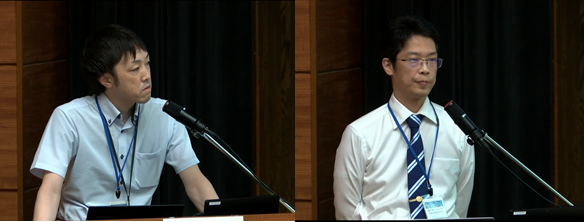 Presentations by Associate Professor Hiroyuki Sugimori (left) and Dr. Kenichi Kono (right)
Presentations by Associate Professor Hiroyuki Sugimori (left) and Dr. Kenichi Kono (right)
Medical AI Research in Gait
In this session, Dr. Toshiyuki Nagai, Associate Professor of Cardiovascular Medicine at Hokkaido University Graduate School of Medicine, and Dr. Tomoyuki Fujioka, Associate Professor of Advanced AI Medical Imaging Diagnostics at Tokyo University of Science, served as session chairs. Presentations were delivered by Dr. Ken Kadoya, Specially Appointed Associate Professor of Advanced Musculoskeletal Medicine at Hokkaido University Graduate School of Medicine, and Dr. Motoki Nakao, Assistant Professor of Pharmacology at Iwate Medical University.
Dr. Kadoya’s presentation, titled “Gait Analysis with AI for Predicting Musculoskeletal Diseases,” introduced an AI model that analyzes gait videos captured by a depth camera to extract key features. This model shows potential in predicting musculoskeletal disorders as well as other diseases affecting gait function.
Dr. Nakao’s presentation, titled “Machine Learning-based Gait Analysis to Predict Clinical Frailty Scale in Elderly Patients with Heart Failure,” showcased an AI model designed to predict the clinical frailty scale based on gait analysis in elderly patients with heart failure. He also discussed the possibility of miniaturizing this AI model for integration into smartphones, suggesting its potential for everyday use in the future.
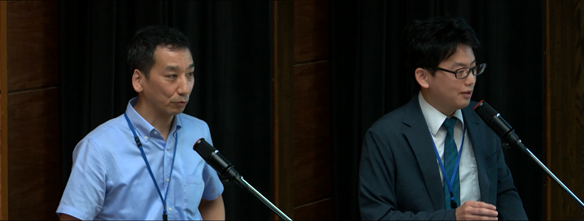
Presentations by Associate Professor Ken Kadoya (left) and Assistant Professor Motoki Nakao (right)
Medical AI Informatics (Online Session)
This session was chaired by Professor Katsuhiko Ogasawara from the Department of Health Sciences at the Graduate School of Health Sciences, Hokkaido University, and Associate Professor Ayako Yagahara from the Faculty of Health and Medical Science, Hokkaido University of Science. The featured speakers were Professor Vikram Patil from the Department of Radiodiagnosis at JSS Medical College, India, and Dr. Mike Conway from the Digital Health Centre for Digital Transformation of Health at the University of Melbourne, Australia.
Professor Vikram Patil delivered a presentation titled “Current Status and Potential of Medical AI in India,” providing a comprehensive overview of India’s healthcare ecosystem. He covered the development of medical AI products, government initiatives, and the role of academic institutions and startups in advancing AI technologies in the medical field.
Dr. Mike Conway’s presentation, titled “Digital Health and Medical AI at the University of Melbourne,” began with an overview of the industry-academia-government collaboration in digital health and medical AI in Australia. He discussed the limitations of medical AI in Australia and introduced The Validitron, a cross-disciplinary team within his center. He also shared research on suicide ideation detection using natural language processing (NLP), highlighting the growing significance of AI in the field of medical information.
The session emphasized AI’s expanding role in transforming medical information systems and improving healthcare outcomes.
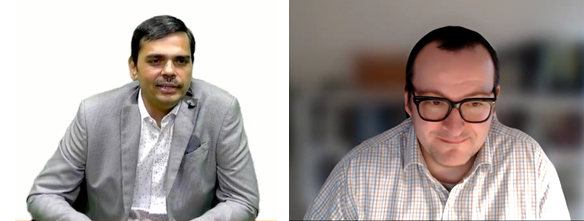 Presentations by Professor Vikram Patil (left) and Lecturer Mike Conway (right)
Presentations by Professor Vikram Patil (left) and Lecturer Mike Conway (right)
Evening Seminar Session 1 hosted by Canon Medical Systems
At the “Evening Seminar 1” hosted by Canon Medical Systems Corporation, Associate Professor Kenji Hirata from the Department of Diagnostic Radiology at Hokkaido University Graduate School of Medicine and Associate Professor Hiroyuki Sugimori from the Division of Biomedical Engineering at Hokkaido University Graduate School of Health Sciences served as session chairs. Dr. Tomohiro Kikuchi, Lecturer at the Data Science Center, Jichi Medical University, delivered the presentation.
Dr. Kikuchi’s lecture, titled “The Evolution and Future of AI in Radiology: Pioneering the Future with Abierto RSS,” began with an overview of the current state of AI in radiology in Japan. He then discussed future directions for AI in radiology and its potential advancements. Following this, he introduced Canon Medical Systems Corporation’s product, Abierto RSS, which integrates various AI models for medical imaging. He presented real-world usage examples, showcasing its application in clinical settings. The seminar concluded with discussions on the future advancements of AI in radiological diagnostics.
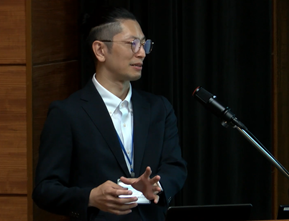 Presentation by Associate Professor Tomohiro Kikuchi
Presentation by Associate Professor Tomohiro Kikuchi
Evening Seminar Session 2 hosted by FUJIFILM Medical Co., Ltd.
At the session chaired by Associate Professor Kenji Hirata from the Department of Diagnostic Radiology at Hokkaido University Graduate School of Medicine and Associate Professor Hiroyuki Sugimori from the Division of Biomedical Engineering at Hokkaido University Graduate School of Health Sciences served as session chairs, presentations were given by Hiroki Ito from Fujifilm Medical Corporation’s Medical Systems Sales Division & IT Solutions Sales Division, along with Dr. Keita Sakamoto and Dr. Daisuke Kato from the same department.
Mr. Ito presented on “Introduction of the Latest AI Technology Implemented in the SYNAPSE SAI Viewer,” where he introduced the development status of AI applications at Fujifilm Medical Corporation and showcased their product, the SYNAPSE SAI Viewer.
Dr. Sakamoto followed with a presentation titled “Function and Usability of the SYNAPSE SAI Viewer – 1,” where he demonstrated the functionalities of the SYNAPSE SAI Viewer using actual clinical CT images, including lung nodule detection, rib fracture detection, and lymph node recognition.
Dr. Kato then presented “Function and Usability of the SYNAPSE SAI Viewer – 2,” focusing on the automatic segmentation of organs and volume measurement functions within the SYNAPSE SAI Viewer applied to CT images.
The usage examples of the SYNAPSE SAI Viewer highlighted its potential to reduce the burden on physicians, prevent oversight, and provide diagnostic indicators through organ volume measurements, offering significant advantages for diagnostic support.

Presentations by Dr. Hiroki Ito (left), Senior Lecturer Keita Sakamoto (center), and
Dr. Daisuke Kato (right)
The Third Hokkaido University Medical AI Symposium has further evolved from last year’s Second Medical AI Symposium, concluding successfully with a diverse program and enthusiastic participants. Discussions on the advancements in medical AI technology and international collaboration took place, fostering expectations for future contributions to the development of the healthcare field. We remain committed to continuing our efforts toward the evolution of AI technology and the improvement of healthcare.
